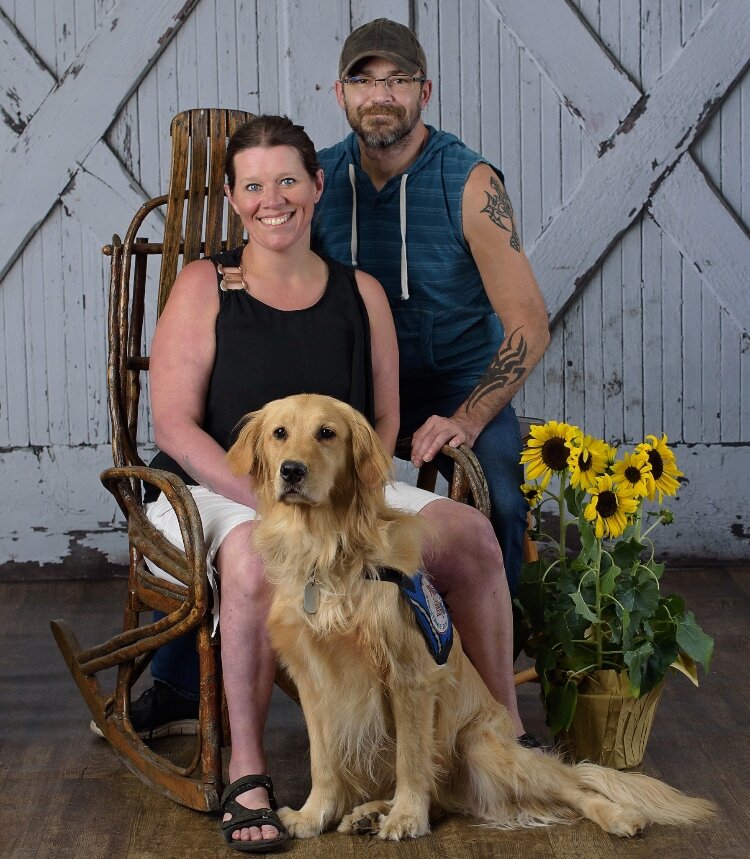A lack of awareness about service animals leads to discrimination
Candace Carlisle says she and her trained service dog regularly are asked to leave restaurants and stores, even though such a request is illegal.
Read this story in Español in El Vocero.
The difficult part about having a disability is that you often must educate people about your right to have equal access to buildings.
It’s an issue that Candace Carlisle knows all too well. She and her Paws With A Cause dog, Denali, recently made headlines when the service dog was denied entrance to an IHOP restaurant in Muskegon, though she explained to the restaurant that the Americans with Disabilities Act (ADA) gives her the right to have a service dog with her.
The experience, which left her in tears, wasn’t the first time she ran into a lack of understanding about rights under the ADA, a federal law passed 33 years ago.
What was different about this experience is that she shared it on social media, generating support. In response, IHOP corporate officers called her to apologize, attributing the incident to a misunderstanding.
Most of her experiences aren’t resolved this way.
“She’s just my personal assistant,” Carlisle says of Denali. “I don’t think people look at it as discrimination, but like I’m trying to pull the wool over their eyes. They don’t realize how embarrassing it is to be treated like I’m doing something wrong when I’m not.”
Dogs allow independence
Paws With A Cause (PAWS) enhances the independence and quality of life for people with disabilities nationally through custom-trained assistance dogs. The West Michigan nonprofit uses education and advocacy to increase awareness of the rights and roles of assistance dog teams, made up of the service dog and the person with the disability.

The Wayland-based organization has been training assistance dogs since 1979. It averages about 50 assistance dog placements a year, and provides support for the lifetime of the team.
“An assistance dog has protection under the Americans with Disabilities Act, which was passed in 1990. To be an assistance dog, the dog must be specifically tasked and trained for one person to mitigate their disability,” says PAWS CEO Michele Suchovsky.
“That means that they must do something specific that relates to the disability and helps to mitigate it in some way. If you use a wheelchair, it may be hard for you to pick things up off the floor, so the dog would be able to pick things up off the floor for you, or open a door or turn on the light.”
Emotional support animals do not have public access rights under the ADA.
“Any dog that we train and place has been tested and made sure it can go into the public environment. We’re making sure not only that dogs are specifically trained for that person, but also that they’re going to act appropriately in public. We also train our clients on what to do if for some reason that dog is misbehaving.”
She says there’s a misconception that people or a business owner can’t do anything if an assistance dog misbehaves. If an assistance dog is barking or jumping up on people, the business owner can ask the person to remove their dog from the premises.
Knowing the rules
Under the ADA, public entities and places of public accommodation such as state and local governments, businesses, and nonprofit organizations can’t discriminate against people with disabilities in their programs, services, or activities. That includes the use of a service animal.

While a business may ask if the service animal is required because of a disability, and what work or task the animal has been trained to perform, they can’t inquire about a person’s disability, require medical information, or ask for training documents related to the service animal.
Unfortunately, discrimination and rejection for service dog owners persist, as businesses and individuals, based on negative experiences with untrained animals, often turn away genuine service dogs and their handlers. This issue is exacerbated by the improper designation of pets as service animals without proper training.
Carlisle was diagnosed with multiple sclerosis in 2009. The chronic disease of the central nervous system has left part of her body paralyzed, often requiring her to use a wheelchair.
She was on a waitlist with Paws With A Cause for almost two years before she received a service dog in 2015. Her specially trained labrador has been life-changing. For the first six months, the nonprofit came weekly to help the two adapt to each other and certified both her and Denali. The nonprofit provided a vest for Denali to wear in public to indicate she’s a service dog.
Steady assistance
“I don’t think I realized what a service dog really does for you,” Carlisle says. “When I got her, I really realized how much help she is. If I drop something, she picks it up. She gets my shoes for me. She takes my jacket off. She opens doors for me. She pretty much does whatever I ask. She helps with everyday things that people take for granted. That gives me more time in the day to do stuff. It gives me more time because I’m not taking the energy to do it. She’s doing it for me.”
Denali doesn’t wear a leash, but she also doesn’t leave Carlisle’s side. Carlisle says it is hard to hold a leash because the right side of her body has limited mobility.
““I only have one hand, so it’s kind of hard to carry a leash,” she says. “And then I have a wheelchair, so she just stays right by my knees. She doesn’t care about anybody. They can walk by her or dogs can walk by, and she just keeps going.”
She tells of an experience visiting a store in her community.
“I made it all the way to the back of the store, and the store was quite busy. And an employee came up to me, and said, ‘Ma’am, you can’t have your dog here without a leash,’” Carlisle says. She replied, “I can’t leash her in, and she’s not moving. She’s right here next to me. It’s not like she’s bothering anybody. I told her that I only have one hand. And she’s like, ‘Your husband can carry it.”
Businesses should know what a service dog should act like, she says.
“If you met Denali when she’s with me, you would instantly know she’s a service dog,” she says. “When we go to a restaurant, Denali sits very quietly under a table. You won’t even know she’s there.”
Business owners’ rights
PAWS’ Suchovsky says business owners have the right to ask two questions. The first is whether the service animal is required because of a disability. They can’t ask the person to disclose their disability. The second is what tasks the dog has been trained to perform.
“If the dog is misbehaving, you can ask the person to remove the dog from the environment. Otherwise that person is entitled to be in your space, and you can’t restrict where they go,” Suchovsky says.
She says she’s seen situations where hotels say they are pet-friendly but restrict people with dogs to certain parts of the hotel. Federal law allows assistance dogs, which are considered medical equipment, to accompany their owner anywhere.
“It’s on the owner to really understand what they can and can’t do,” Suchovsky says. “But that being said, they don’t have to have some sort of ID or anything like that. Now, if your dog comes from our organization, we’re giving you all of that because we know it helps to have the information you need, but that is not required.
“Most of our clients all keep their IDs with them, and now many of them have digital IDs. But the business owner can’t ask for it.”
While PAWS teaches clients how to advocate for themselves, there are still situations where business owners don’t know what questions to ask or how to handle the situation.
“How would you feel if somebody says you don’t have the right to be here, even though you do and then when you try to explain it, they shut you down,” Suchovsky says.” It’s really disempowering, and it can be really scary.”
She tells of a client she was helping after being denied access to a hotel.
“We were trying to work through it with the hotel. She finally said, ‘I don’t even feel safe staying here. I feel unwelcome.’ So we found another hotel for her.”
PAWS provides training to businesses to help them understand their rights.
“We’re always happy to talk to businesses, and help them know what to do and what questions to ask and how to be inclusive,” Suchovsky says.
This article is a part of the multi-year series Disability Inclusion, exploring the state of West Michigan’s growing disability community. The series is made possible through a partnership with Centers for Independent Living organizations across West Michigan.











